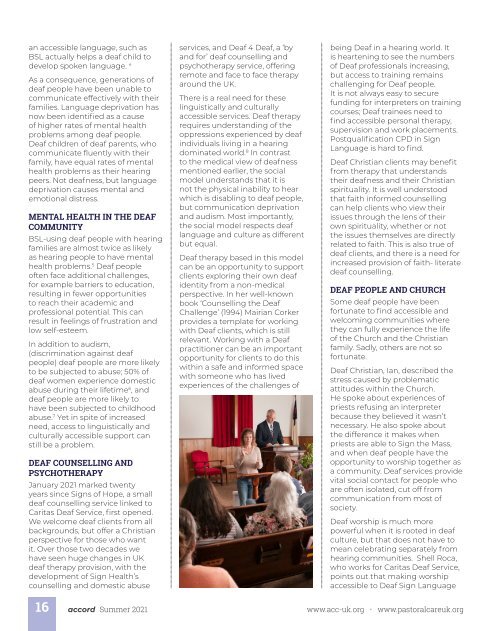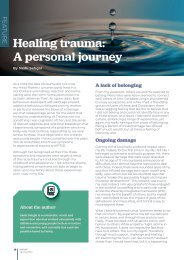ACC Accord Summer 2021 Issue 111
Create successful ePaper yourself
Turn your PDF publications into a flip-book with our unique Google optimized e-Paper software.
an accessible language, such as<br />
BSL actually helps a deaf child to<br />
develop spoken language. 4<br />
As a consequence, generations of<br />
deaf people have been unable to<br />
communicate effectively with their<br />
families. Language deprivation has<br />
now been identified as a cause<br />
of higher rates of mental health<br />
problems among deaf people.<br />
Deaf children of deaf parents, who<br />
communicate fluently with their<br />
family, have equal rates of mental<br />
health problems as their hearing<br />
peers. Not deafness, but language<br />
deprivation causes mental and<br />
emotional distress.<br />
MENTAL HEALTH IN THE DEAF<br />
COMMUNITY<br />
BSL-using deaf people with hearing<br />
families are almost twice as likely<br />
as hearing people to have mental<br />
health problems. 5 Deaf people<br />
often face additional challenges,<br />
for example barriers to education,<br />
resulting in fewer opportunities<br />
to reach their academic and<br />
professional potential. This can<br />
result in feelings of frustration and<br />
low self-esteem.<br />
In addition to audism,<br />
(discrimination against deaf<br />
people) deaf people are more likely<br />
to be subjected to abuse; 50% of<br />
deaf women experience domestic<br />
abuse during their lifetime 6 , and<br />
deaf people are more likely to<br />
have been subjected to childhood<br />
abuse. 7 Yet in spite of increased<br />
need, access to linguistically and<br />
culturally accessible support can<br />
still be a problem.<br />
DEAF COUNSELLING AND<br />
PSYCHOTHERAPY<br />
January <strong>2021</strong> marked twenty<br />
years since Signs of Hope, a small<br />
deaf counselling service linked to<br />
Caritas Deaf Service, first opened.<br />
We welcome deaf clients from all<br />
backgrounds, but offer a Christian<br />
perspective for those who want<br />
it. Over those two decades we<br />
have seen huge changes in UK<br />
deaf therapy provision, with the<br />
development of Sign Health’s<br />
counselling and domestic abuse<br />
services, and Deaf 4 Deaf, a ‘by<br />
and for’ deaf counselling and<br />
psychotherapy service, offering<br />
remote and face to face therapy<br />
around the UK.<br />
There is a real need for these<br />
linguistically and culturally<br />
accessible services. Deaf therapy<br />
requires understanding of the<br />
oppressions experienced by deaf<br />
individuals living in a hearing<br />
dominated world. 8 In contrast<br />
to the medical view of deafness<br />
mentioned earlier, the social<br />
model understands that it is<br />
not the physical inability to hear<br />
which is disabling to deaf people,<br />
but communication deprivation<br />
and audism. Most importantly,<br />
the social model respects deaf<br />
language and culture as different<br />
but equal.<br />
Deaf therapy based in this model<br />
can be an opportunity to support<br />
clients exploring their own deaf<br />
identity from a non-medical<br />
perspective. In her well-known<br />
book ‘Counselling the Deaf<br />
Challenge’ (1994) Mairian Corker<br />
provides a template for working<br />
with Deaf clients, which is still<br />
relevant. Working with a Deaf<br />
practitioner can be an important<br />
opportunity for clients to do this<br />
within a safe and informed space<br />
with someone who has lived<br />
experiences of the challenges of<br />
being Deaf in a hearing world. It<br />
is heartening to see the numbers<br />
of Deaf professionals increasing,<br />
but access to training remains<br />
challenging for Deaf people.<br />
It is not always easy to secure<br />
funding for interpreters on training<br />
courses; Deaf trainees need to<br />
find accessible personal therapy,<br />
supervision and work placements.<br />
Postqualification CPD in Sign<br />
Language is hard to find.<br />
Deaf Christian clients may benefit<br />
from therapy that understands<br />
their deafness and their Christian<br />
spirituality. It is well understood<br />
that faith informed counselling<br />
can help clients who view their<br />
issues through the lens of their<br />
own spirituality, whether or not<br />
the issues themselves are directly<br />
related to faith. This is also true of<br />
deaf clients, and there is a need for<br />
increased provision of faith- literate<br />
deaf counselling.<br />
DEAF PEOPLE AND CHURCH<br />
Some deaf people have been<br />
fortunate to find accessible and<br />
welcoming communities where<br />
they can fully experience the life<br />
of the Church and the Christian<br />
family. Sadly, others are not so<br />
fortunate.<br />
Deaf Christian, Ian, described the<br />
stress caused by problematic<br />
attitudes within the Church.<br />
He spoke about experiences of<br />
priests refusing an interpreter<br />
because they believed it wasn’t<br />
necessary. He also spoke about<br />
the difference it makes when<br />
priests are able to Sign the Mass,<br />
and when deaf people have the<br />
opportunity to worship together as<br />
a community. Deaf services provide<br />
vital social contact for people who<br />
are often isolated, cut off from<br />
communication from most of<br />
society.<br />
Deaf worship is much more<br />
powerful when it is rooted in deaf<br />
culture, but that does not have to<br />
mean celebrating separately from<br />
hearing communities. Shell Roca,<br />
who works for Caritas Deaf Service,<br />
points out that making worship<br />
accessible to Deaf Sign Language<br />
16 accord <strong>Summer</strong> <strong>2021</strong> www.acc-uk.org • www.pastoralcareuk.org



